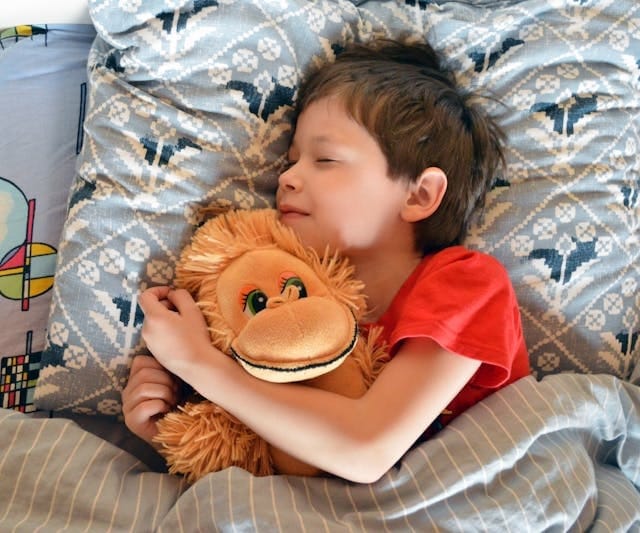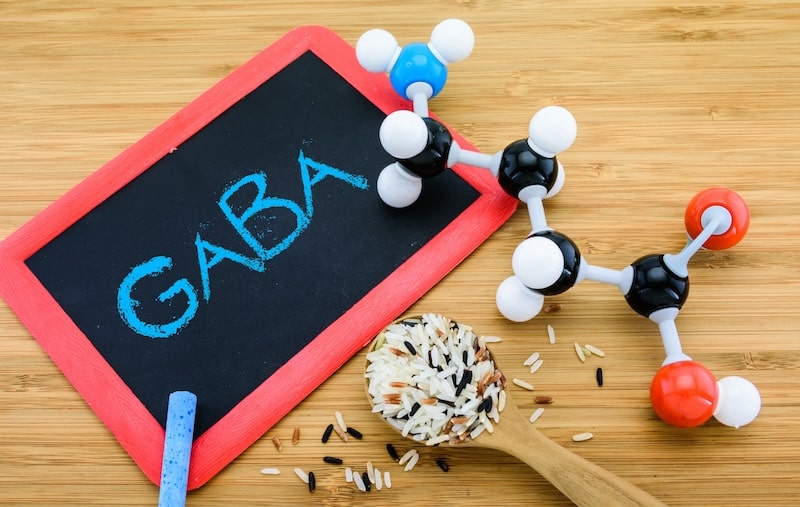GABA for Kids: Is GABA Safe for Helping Kids Sleep?
As parents increasingly seek natural remedies to help their children sleep, GABA (Gamma-Aminobutyric Acid) has gained attention as a potential solution.
GABA is a neurotransmitter that plays a key role in promoting relaxation and reducing neuronal excitability, making it a popular choice for improving sleep quality.
As a parent and a nutrition educator, I understand the importance of thoroughly understanding the potential benefits and risks associated with any supplement before considering it for your child.
In my opinion, there is not enough evidence to support giving GABA to kids for sleep.
Notably, a systematic review published in Frontiers in Neuroscience indicates that the evidence supporting the efficacy of oral GABA intake for improving sleep is very limited, highlighting the need for caution in considering GABA supplements for children.
Please read below for a detailed understanding of GABA for kids.
What is GABA?
GABA, or Gamma-Aminobutyric Acid, is a naturally occurring neurotransmitter in the brain that plays a pivotal role in regulating neuronal excitability throughout the nervous system.
It acts as the primary inhibitory neurotransmitter, which means it helps to calm neural activity.
By binding to GABA receptors in the brain, it reduces the firing of neurons, promoting relaxation and a sense of calm.
This function is essential in maintaining a balanced state of mental and emotional well-being.
GABA is produced in the body from glutamate, another neurotransmitter, and is crucial for maintaining a healthy balance between excitation and inhibition in the brain.
When the levels of GABA are optimal, it can help mitigate the effects of stress and anxiety, contributing to better sleep quality and overall mental health.
However, the effectiveness and safety of GABA supplements, particularly for children, require careful consideration and further research.
Understanding the Sleep Challenges in Children
Sleep problems are common among children, ranging from difficulty falling asleep to frequent nighttime awakenings and insomnia.
These issues can stem from various factors, including stress, anxiety, poor sleep hygiene, and medical conditions.
However, adequate sleep is crucial for healthy growth and development for children, impacting everything from cognitive function and emotional regulation to physical health and immune function.
Effects of Poor Sleep
Sleep disturbances in children can lead to significant consequences.
Poor sleep can affect a child’s mood, behavior, and academic performance, leading to issues such as irritability, difficulty concentrating, and hyperactivity.
Additionally, chronic sleep deprivation can weaken the immune system, making children more susceptible to illnesses and impairing their overall well-being.
Traditional treatments for sleep problems in children often involve behavioral interventions, such as establishing a consistent bedtime routine, creating a calming sleep environment, and limiting screen time before bed.
While these methods can be effective, they do not always address the underlying issues, and some parents may seek alternative or supplemental solutions, such as natural sleep aids.
Understanding the nature of sleep challenges in children and the potential impact on their health underscores the importance of exploring all available options, including GABA supplements.
However, it is essential to weigh the potential benefits against the risks to ensure the best outcomes for children.
GABA as a Sleep Aid: Potential Benefits
GABA supplements have garnered interest for their potential to enhance sleep by leveraging the natural calming effects of this neurotransmitter.
Several forms of GABA supplements are available on the market, including capsules, tablets, and powders.
These supplements are often marketed as stress relievers and sleep aids, with claims that they can help reduce anxiety, promote a sense of calm, and facilitate the onset of sleep.
For children struggling with sleep disturbances, the promise of a natural, non-pharmaceutical solution can be particularly appealing to parents seeking to avoid the side effects of traditional medications.
Some parents have reported anecdotal evidence of success, noting improvements in their children’s ability to fall asleep and stay asleep after using GABA supplements.
Despite these promising reports, it is crucial to approach the use of GABA supplements with caution.
The current scientific evidence supporting their efficacy for children’s sleep is limited.
A systematic review published in Frontiers in Neuroscience found limited evidence for GABA’s stress-reducing benefits and very limited evidence for its sleep-enhancing effects.
Furthermore, the bioavailability of GABA supplements—how effectively they are absorbed and utilized by the body—remains a subject of debate.
Given the theoretical benefits of GABA in promoting sleep and the anecdotal successes shared by some parents, it is understandable why GABA supplements might be considered as a potential solution for children’s sleep problems.
However, it is crucial to base decisions on thorough research and consultation with healthcare professionals to ensure safety and appropriateness for each child.
This natural sleep formula includes GABA, Suntheanine®, and other ingredients like Hops Extract and 5-HTP, which work together to relax the brain, stabilize blood sugar, and encourage melatonin production.
Safety Concerns
While GABA naturally occurs in the body and plays a crucial role in promoting relaxation, the safety of its supplementation, especially for young children, is not well-established.
Research on GABA supplements is still in its infancy, particularly concerning pediatric use.
Given the mixed results from existing studies, the potential for adverse effects remains a significant concern.
Potential side effects of GABA supplements include dizziness, nausea, and in some cases, a paradoxical increase in anxiety.
These effects can vary significantly from person to person, making it challenging to predict how a child might respond.
Additionally, GABA supplements may interact with other medications or underlying health conditions, further complicating their use in children.
Age-specific considerations are also critical.
Children’s developing brains and bodies may react differently to supplements compared to adults.
The appropriate dosage for children, if any, has not been clearly established, raising the risk of overuse or misuse.
Furthermore, the regulatory status and quality control of GABA supplements can vary widely.
Unlike prescription medications, dietary supplements are not always subject to rigorous testing for safety and efficacy.
This variability can lead to inconsistencies in product quality, making it even more challenging to ensure safe use in children.
Given my history with Tourette Syndrome, this reaction was particularly alarming.
The sensation was so uncomfortable that I had to leave my bed until the effects wore off.
This negative experience has led me to avoid GABA supplements entirely and to advise others to approach them with caution.
In my opinion, parents should be especially cautious and consult with healthcare professionals before introducing any new supplement into their child’s regimen.
Given the limited and mixed evidence on the effectiveness and safety of GABA for sleep, the potential risks outweigh the benefits.
Practical Tips for Improving Children’s Sleep

Improving children’s sleep often requires a combination of different approaches.
By implementing the right practical tips, parents can improve their children’s sleep without the need for supplements.
Fostering healthy sleep habits and creating a supportive sleep environment can lead to lasting benefits for children’s overall well-being and development.
I certainly won’t say my son is the best sleeper, but here are some practical, non-pharmacological strategies that can help, which have helped my son establish a consistent sleep schedule.
Consistent Bedtime Routine
A predictable bedtime routine helps signal to children that it is time to wind down and prepare for sleep.
This routine can include activities such as taking a warm bath, reading a book, or listening to calming music.
Consistency in these activities can create a sense of security and relaxation, making it easier for children to fall asleep.
Optimal Sleep Environment
Creating a sleep-conducive environment is crucial.
The bedroom should be dark, quiet, and cool.
Using blackout curtains can help block out light, while white noise machines can mask disruptive sounds.
Additionally, ensuring that the bed and bedding are comfortable can make a significant difference in the quality of sleep.
Limiting Screen Time
Exposure to screens before bedtime can interfere with the body’s natural sleep-wake cycle.
The blue light emitted by phones, tablets, and computers can inhibit the production of melatonin, a hormone that promotes sleep.
Limiting screen time at least an hour before bed can help children fall asleep more easily.
Regular Physical Activity
Engaging in regular physical activity during the day can help children expend energy and promote better sleep at night.
Activities such as playing outside, participating in sports, or even taking a family walk can contribute to better overall sleep patterns.
However, vigorous exercise should be avoided close to bedtime, as it can have a stimulating effect.
Balanced Diet
A balanced diet plays a role in sleep quality.
Foods rich in tryptophan, magnesium, and calcium can support the production of sleep-promoting hormones.
Providing a light snack before bed, such as a banana or a small glass of milk with honey, can help children feel more relaxed and ready for sleep.
For kids who like “snacks,” Hippeas Chickpeas Puffs are a healthy option that tastes great and contains a significant amount of tryptophan.
It’s important to avoid caffeine and sugary foods, especially in the evening, as they can interfere with sleep.
Managing Stress and Anxiety
Children, like adults, can experience stress and anxiety that affects their sleep.
Teaching children relaxation techniques such as deep breathing, progressive muscle relaxation (my favorite option), or guided imagery can help them manage anxiety and feel more at ease at bedtime.
Creating a calm and supportive atmosphere can also alleviate bedtime worries.



